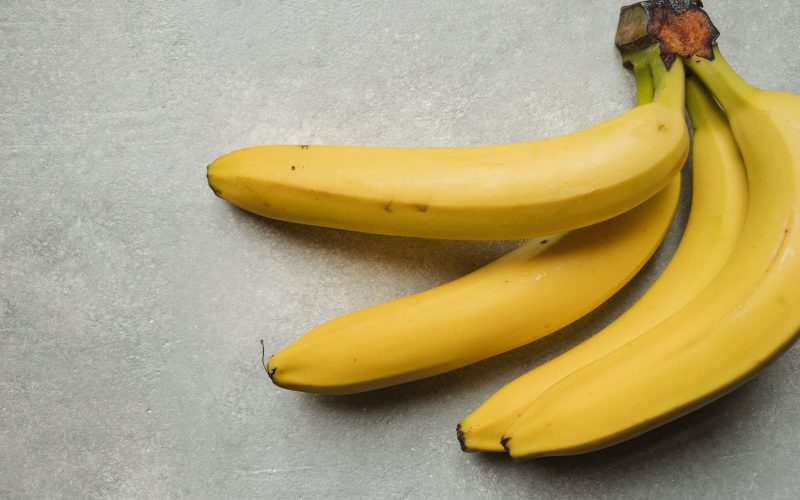Bananas are a popular fruit known for their delicious taste and nutritional benefits. But have you ever wondered how many calories are in a banana?
A medium-sized banana contains about 105 calories. The calorie content can vary depending on the size of the banana, with extra small bananas containing 72 calories and extra large bananas containing 135 calories.
Bananas are primarily composed of carbohydrates, with about 93% of their calories coming from carbs.
The carb content of a medium-sized banana is about 27 grams, including 3 grams of fiber and 14 grams of sugar.
Unripe bananas contain more resistant starch, which acts like fiber in the body and feeds beneficial gut bacteria.
Bananas also contain various other vitamins and minerals, such as potassium, vitamin B6, vitamin C, manganese, folate, and riboflavin.
Overall, bananas are a nutritious and low-calorie snack that can be enjoyed as part of a healthy diet.
Nutritional Information of a Banana
Bananas are not just a tasty snack, but they also offer a range of essential nutrients for your body.
A medium-sized banana contains about 105 calories, making it a relatively low-calorie option.
However, the calorie content can vary depending on the size of the banana. Extra small bananas have about 72 calories, while extra large ones contain around 135 calories.
Carbohydrates are the primary macronutrient found in bananas, making up about 93% of their calorie content.
A medium-sized banana contains approximately 27 grams of carbs, including 3 grams of fiber and 14 grams of sugar.
The fiber content helps support healthy digestion, while the sugar provides a natural source of energy.
Aside from their carbohydrate content, bananas also boast an array of vitamins and minerals.
They are rich in potassium, which is essential for maintaining proper heart function and regulating blood pressure.
Bananas are also a good source of vitamin B6, vitamin C, manganese, folate, and riboflavin.
These nutrients play various roles in promoting overall health and well-being.
Additionally, unripe bananas contain more resistant starch, which acts like fiber in the body.
This type of starch is not easily digested and can help promote feelings of fullness and support gut health by feeding beneficial gut bacteria.
Calorie Content of Bananas
The calorie content of a banana can vary depending on its size, with smaller bananas containing fewer calories than larger ones.
A medium-sized banana typically contains about 105 calories, making it a relatively low-calorie snack option.
If you’re looking for even fewer calories, you can opt for an extra small banana, which contains around 72 calories.
On the other hand, if you prefer a larger banana, an extra large one may have approximately 135 calories.
However, it’s important to note that these figures are just estimates, as the calorie count can also vary slightly based on factors such as ripeness and variety.
When it comes to the nutritional composition of bananas, they are primarily composed of carbohydrates.
In fact, about 93% of the calories in a banana come from carbs.
A medium-sized banana typically contains around 27 grams of carbohydrates, including 3 grams of fiber and 14 grams of sugar.
While the sugar content may seem high, it’s worth noting that bananas also contain beneficial nutrients.
They are a good source of potassium, vitamin B6, vitamin C, manganese, folate, and riboflavin.
These vitamins and minerals contribute to overall health and well-being, making bananas not only tasty but also a nutritious choice when it comes to snacking.
In summary, bananas are a versatile fruit that can be enjoyed in various ways.
They provide a moderate amount of calories, with smaller bananas containing fewer calories than larger ones.
Additionally, they offer a range of important vitamins and minerals, making them a healthy addition to your diet.
Other Key Facts about Bananas
In addition to their calorie content, bananas offer a range of essential vitamins and minerals that can contribute to a balanced diet and support various bodily functions.
One medium-sized banana contains about 105 calories, making it a low-calorie snack option.
However, the calorie content can vary depending on the size of the banana.
Extra small bananas contain approximately 72 calories, while extra large bananas can have around 135 calories.
Carbohydrates make up the majority of a banana’s composition, with about 93% of its calories coming from carbs.
A medium-sized banana contains approximately 27 grams of carbohydrates, including 3 grams of fiber and 14 grams of sugar.
The fiber content helps regulate digestion, while the natural sugars provide a quick source of energy.
Furthermore, bananas are a good source of essential vitamins and minerals.
They are rich in potassium, which is vital for maintaining proper heart and muscle function.
Bananas also contain significant amounts of vitamin B6, which supports brain development and function.
Additionally, they provide vitamin C, manganese, folate, and riboflavin, which contribute to overall health and protect against various diseases.
Unripe bananas contain a higher amount of resistant starch, which acts as a form of fiber in the body.
This type of starch is not fully digested, and instead, it contributes to the growth of beneficial gut bacteria.
As bananas ripen, the resistant starch converts into simpler sugars, making them sweeter and easier to digest.








Thank you, Kingsley Felix, for the detailed and informative article on the calorie content and nutritional benefits of bananas. It’s refreshing to see how you’ve highlighted not just the calorie counts but also the broader health benefits and the variations depending on the size and ripeness of the bananas. However, while the article is rich in content, it might benefit from a more concise summary or a clearer section on the practical implications of these nutritional facts for daily consumption, to enhance readability and practical application for your readers.
I love using bananas in my recipes and it’s amazing how the fiber in it makes my recipe healthy.
thanks a lot